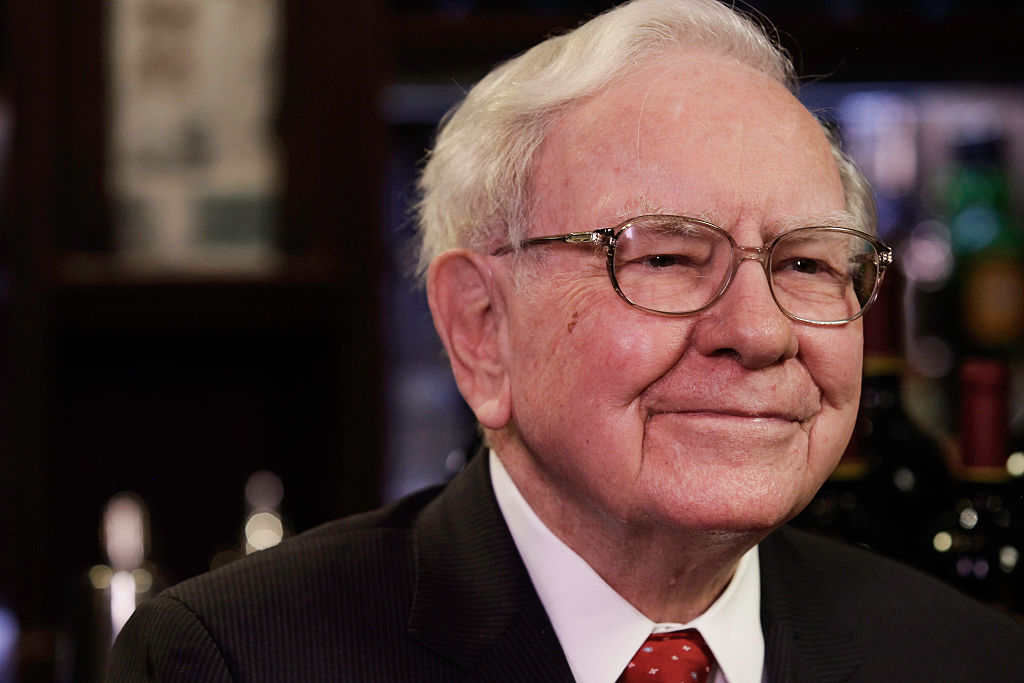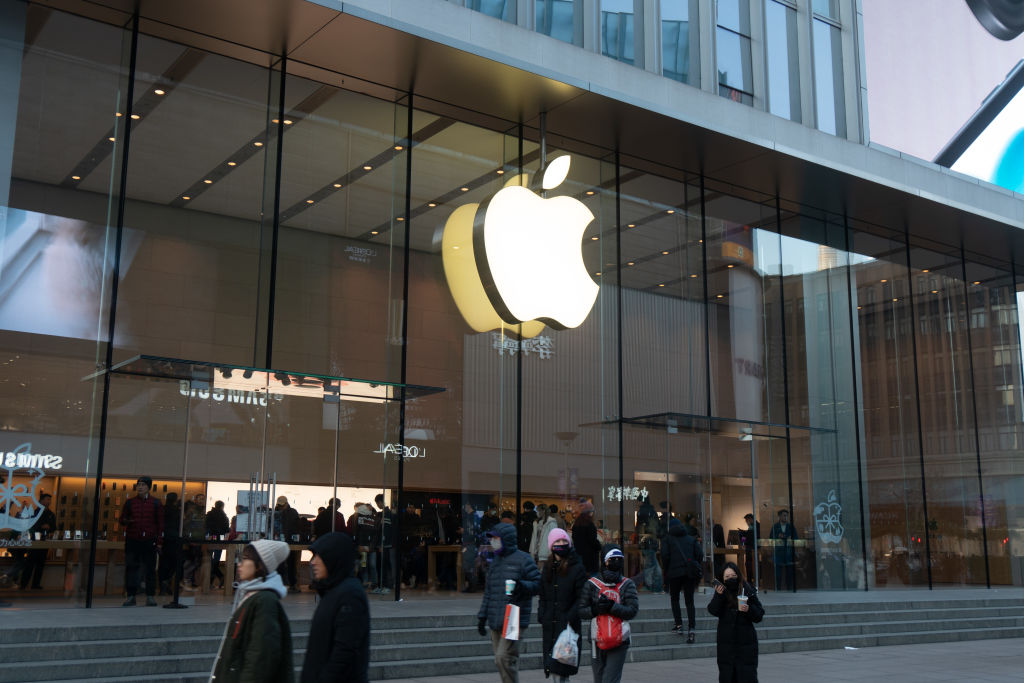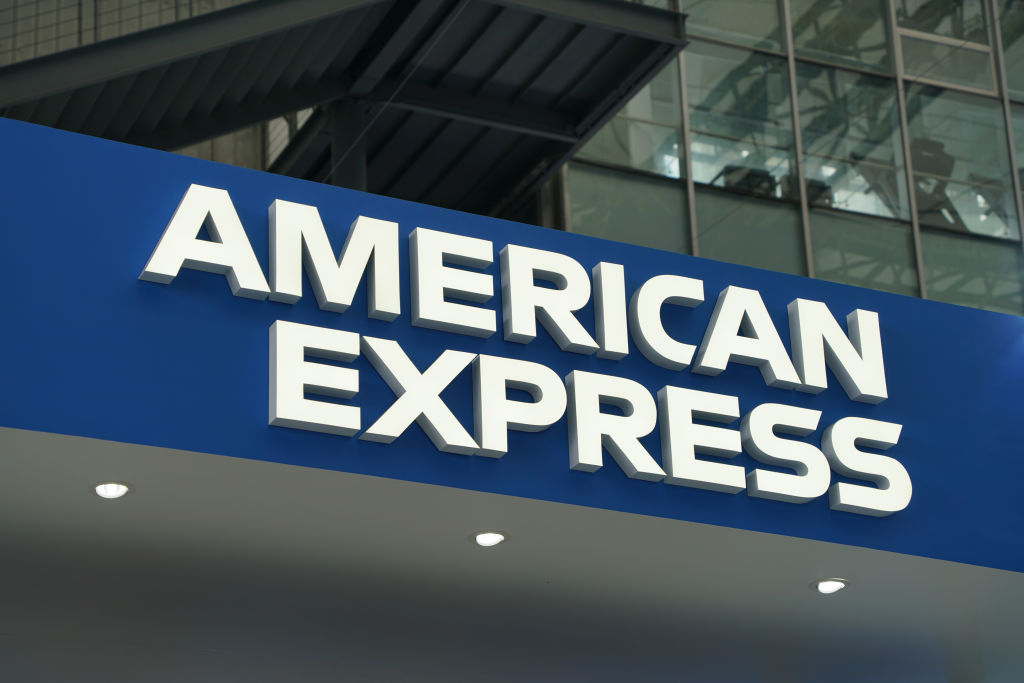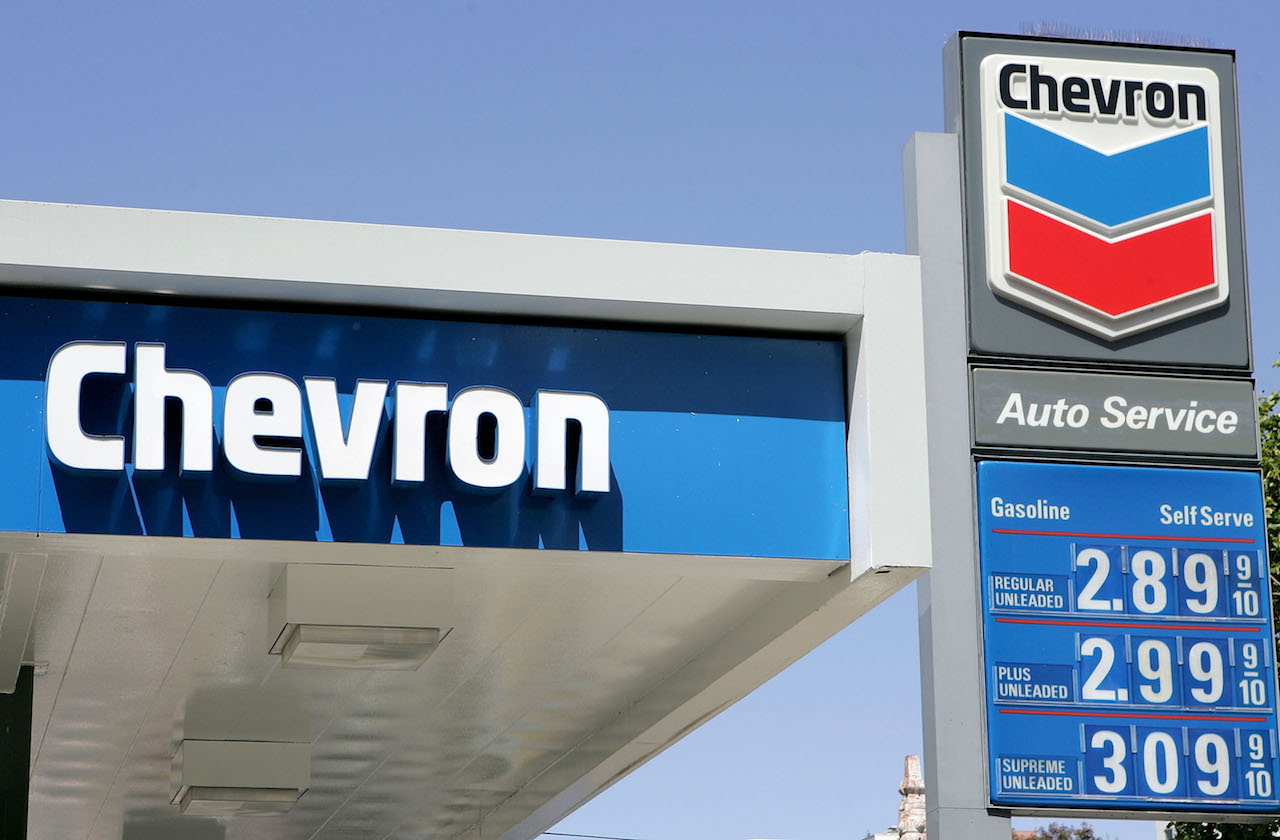Warren Buffett Stocks: A Look at Berkshire Hathaway's Holdings
Warren Buffett's holdings are a diverse set of blue chips and lesser-known growth bets. Here, we look at Buffett's stock picks, as well as those of his lieutenants.

Profit and prosper with the best of Kiplinger's advice on investing, taxes, retirement, personal finance and much more. Delivered daily. Enter your email in the box and click Sign Me Up.
You are now subscribed
Your newsletter sign-up was successful
Want to add more newsletters?

Delivered daily
Kiplinger Today
Profit and prosper with the best of Kiplinger's advice on investing, taxes, retirement, personal finance and much more delivered daily. Smart money moves start here.

Sent five days a week
Kiplinger A Step Ahead
Get practical help to make better financial decisions in your everyday life, from spending to savings on top deals.

Delivered daily
Kiplinger Closing Bell
Get today's biggest financial and investing headlines delivered to your inbox every day the U.S. stock market is open.

Sent twice a week
Kiplinger Adviser Intel
Financial pros across the country share best practices and fresh tactics to preserve and grow your wealth.

Delivered weekly
Kiplinger Tax Tips
Trim your federal and state tax bills with practical tax-planning and tax-cutting strategies.

Sent twice a week
Kiplinger Retirement Tips
Your twice-a-week guide to planning and enjoying a financially secure and richly rewarding retirement

Sent bimonthly.
Kiplinger Adviser Angle
Insights for advisers, wealth managers and other financial professionals.

Sent twice a week
Kiplinger Investing Weekly
Your twice-a-week roundup of promising stocks, funds, companies and industries you should consider, ones you should avoid, and why.

Sent weekly for six weeks
Kiplinger Invest for Retirement
Your step-by-step six-part series on how to invest for retirement, from devising a successful strategy to exactly which investments to choose.

Warren Buffett's stock picks aren't what they used to be. The Berkshire Hathaway (BRK.B) equity portfolio has changed dramatically in the past few years.
Although old-guard favorites such as American Express (AXP) and Coca-Cola (KO) still form the core of the portfolio, Buffett & Co. have taken a shine to names such as Apple (AAPL), Amazon (AMZN) and, most recently, Alphabet (GOOGL).
One thing that hasn't changed, however, is Buffett's preference for maintaining a highly concentrated portfolio.
From just $107.88 $24.99 for Kiplinger Personal Finance
Become a smarter, better informed investor. Subscribe from just $107.88 $24.99, plus get up to 4 Special Issues

Sign up for Kiplinger’s Free Newsletters
Profit and prosper with the best of expert advice on investing, taxes, retirement, personal finance and more - straight to your e-mail.
Profit and prosper with the best of expert advice - straight to your e-mail.
Excluding the company's Japanese brokerage stocks and other overseas equities, Apple alone accounts for more than a fifth of Berkshire's stock portfolio, according to data from WhaleWisdom. (That's down from more than 40% at its peak.)
Furthermore, Berkshire's top five U.S. equity holdings comprise about 70% of its portfolio value, while the top 10 account for 87%.
As Buffett likes to say, diversification is for those who don't know what they're doing.
Note that Buffett handles the largest positions in the Berkshire Hathaway portfolio.
Buffett says his co-managers — Ted Weschler and Todd Combs, who is CEO of Geico — act independently. They're thought to manage about 10% of the portfolio. Buffettologists generally assume Berkshire's smaller buys and sells are the work of these colleagues.
This will likely change when Buffett retires as CEO of his holding company at year's end, and Greg Abel, head of Berkshire Hathaway Energy, steps into the role.
Regardless, whether we're talking about Berkshire's biggest bets or the scores of stocks it maintains at the margins, Buffett's focus shifted after the COVID-19 pandemic.
Buffett owned airline stocks at the start of 2020; now he holds none. Banks were aces among Buffett stocks to begin 2020; Berkshire soon kicked most of them to the curb.
It seems like only yesterday that Buffett was an enthusiastic buyer of select pharmaceutical names. Today, most of those positions have been closed out, too.
If you want to know which stocks Warren Buffett is buying and selling, look no further than the Berkshire Hathaway's holdings.
Price, share totals and other data as of September 30, 2025. Sources: Berkshire Hathaway's SEC Form 13F filed November 14, 2025, for the reporting period ended September 30, 2025; and WhaleWisdom.
The Berkshire Hathaway portfolio
Company | Shares held | Holding value | Percent of portfolio |
|---|---|---|---|
Apple (AAPL) | 238,212,764 | $60,656,116,097 | 22.69% |
American Express (AXP) | 151,610,700 | $50,359,010,112 | 18.84% |
Bank of America (BAC) | 568,070,012 | $29,306,731,919 | 10.96% |
Coca-Cola (KO) | 400,000,000 | $26,528,000,000 | 9.92% |
Chevron (CVX) | 122,064,792 | $18,955,441,549 | 7.09% |
Occidental Petroleum (OXY) | 264,941,431 | $12,518,482,615 | 4.68% |
Moody's (MCO) | 24,669,778 | $11,754,655,821 | 4.40% |
Chubb (CB) | 31,332,895 | $8,843,709,614 | 3.31% |
Kraft Heinz (KHC) | 325,634,818 | $8,479,530,661 | 3.17% |
Alphabet (GOOGL) | 17,846,142 | $4,338,397,121 | 1.62% |
Kroger (KR) | 50,000,000 | $3,370,500,001 | 1.26% |
Sirius XM Holdings (SIRI) | 124,807,117 | $2,904,885,649 | 1.09% |
Visa (V) | 8,297,460 | $2,832,586,895 | 1.06% |
VeriSign (VRSN) | 8,989,880 | $2,513,300,752 | 0.94% |
Mastercard (MA) | 3,986,648 | $2,267,645,249 | 0.85% |
Amazon.com (AMZN) | 10,000,000 | $2,195,700,000 | 0.82% |
Constellation Brands (STZ) | 13,400,000 | $1,804,578,000 | 0.68% |
UnitedHealth Group (UNH) | 5,039,564 | $1,740,161,449 | 0.65% |
Capital One Financial (COF) | 7,150,000 | $1,519,947,000 | 0.57% |
Aon (AON) | 4,100,000 | $1,461,978,000 | 0.55% |
Domino's Pizza (DPZ) | 2,981,945 | $1,287,335,476 | 0.48% |
Ally Financial (ALLY) | 29,000,000 | $1,136,800,000 | 0.43% |
Pool (POOL) | 3,458,885 | $1,072,496,472 | 0.40% |
Liberty Media (LLYVK) | 10,917,661 | $1,058,685,587 | 0.40% |
Lennar (LEN) | 7,050,950 | $888,701,738 | 0.33% |
Nucor (NUE) | 6,407,749 | $867,801,447 | 0.32% |
Louisiana Pacific (LPX) | 5,664,793 | $503,260,211 | 0.19% |
Liberty Media (LLYVA) | 4,986,588 | $470,235,248 | 0.18% |
Heico (HEI) | 1,294,612 | $328,947,963 | 0.12% |
Formula One Group (FWONK) | 3,018,555 | $315,288,070 | 0.12% |
Charter Communications (CHTR) | 1,060,882 | $291,853,943 | 0.11% |
Lamar Advertising (LAMR) | 1,202,110 | $147,162,306 | 0.06% |
Allegion (ALLE) | 780,133 | $138,356,588 | 0.05% |
NVR (NVR) | 11,112 | $89,281,142 | 0.03% |
Jefferies (JEF) | 433,558 | $28,363,364 | 0.01% |
Liberty Latin America Class A (LILA) | 2,630,792 | $21,809,266 | 0.01% |
Lennar Class B (LEN.B) | 180,980 | $21,715,790 | 0.01% |
Diageo (DEO) | 227,750 | $21,734,183 | 0.01% |
Liberty Latin America Class C (LILAK) | 1,284,020 | $10,837,129 | less than 0.01% |
Atlanta Braves Holdings (BATRK) | 223,645 | $9,301,396 | less than 0.01% |
Stocks Warren Buffett is buying
- Alphabet was the most addition position to the BRK.A portfolio in the third quarter, with the Google parent now Berkshire's 10th-largest holding.
- There are now three Magnificent 7 stocks in the Berkshire Hathaway equity portfolio: Alphabet, Amazon.com and Apple.
- Berkshire also raised its stakes in Chubb, Domino's Pizza, Lennar, Lamar Advertising and Sirius XM in Q3.
Berkshire has a massive stake in Apple and a modest position in Amazon.com, but otherwise it hasn't been a big fan of the Magnificent 7. So it's something of a surprise that the holding company initiated a sizable stake in Alphabet.
Berkshire bought 17.8 million shares in GOOGL worth $4.3 billion as of the end of Q3. With a weight of 1.6%, the tech giant is now Berkshire's 10th-largest holding. While that seems significant, keep in mind that the position is still worth roughly half of No. 9 holding Kraft Heinz (KHC), which accounts for more than 3% of the portfolio.
GOOGL stock was negative for the year-to-date until mid-July and didn't start outperforming the S&P 500 until late August. With shares now up 45% in 2025 – vs 16% for the broader market – Berkshire appears to have spied a beaten-down bargain.
Elsewhere, Berkshire made minor additions to five other smaller holdings.
The company increased its stake in Chubb (CB), which it has held since the first quarter of 2024, by almost 16%, or 4.3 million shares. With a market value of $8.8 billion as of September 30, CB is Berkshire's eighth-largest holding.
Berkshire also continued to add to its investment in Domino's Pizza (DPZ), which it initiated in the third quarter of last year. The holding company increased its stake by more than 13% and now owns nearly 3 million shares in the pizza chain worth $1.3 billion. At less than 0.5% of the portfolio, DPZ is Berkshire's 22nd-largest position.
Berkshire also once again boosted its stake in Sirius XM Holdings (SIRI), this time by 4.2%. At a bit more than 1% of the portfolio, SIRI is Berkshire's 11th-largest holding.
Lastly, Berkshire made incremental and essentially immaterial additional investments in Lamar Advertising (LAMR) and Lennar (LEN).
Stocks Warren Buffett is selling
- Warren Buffett continued to pare back exposure to Apple in the BRK.A portfolio in Q3.
- Despite selling more than 41 million shares, Apple remains the top holding in the Berkshire Hathaway equity portfolio.
- Warren Buffett also sold shares in Bank of America, Nucor, DaVita and VeriSign, and closed Berkshire's D.R. Horton position.
Buffett continued to pare back Berkshire's position in Apple, which, as recently as last year, accounted for roughly 40% of its U.S. holdings. The company sold more than 41 million shares over the course of the third quarter – a 15% reduction – but Buffett has hardly lost faith in the iPhone maker.
With nearly 240 million shares worth more than $60 billion as of September 30, AAPL remains Berkshire's largest holding by far, accounting for nearly 23% of its total value.
In another reprise from previous quarters, Buffett once again sold Bank of America stock, which has been a major holding since 2017. Berkshire reduced its investment in the nation's second-largest bank by assets by another 6.2% in Q3, selling more than 37 million shares.
With 568 million shares worth more than $29 billion as of September 30, BAC is Berkshire's third-largest holding, accounting for 11% of the portfolio value.
In other sales, Berkshire continued to sell VeriSign (VRSN), cutting the position by a third, or 4.3 million shares. With a bit less than 9 million shares worth $2.5 billion, VRSN now accounts for less than 1% of Berkshire's equity portfolio.
Other stocks Berkshire continued to ease up on included Nucor (NUE) and DaVita (DVA).
Lastly, Berkshire exited its position in homebuilder D.R. Horton (DHI), a stake it initiated the previous quarter.
Berkshire's top five holdings
- Warren Buffett has always maintained a concentrated Berkshire Hathaway equity portfolio.
- The top five positions in the BRK.A portfolio account for 70% of its total value.
- Apple, American Express, Bank of America, Coca-Cola and Chevron are the five largest holdings in the BRK.A portfolio.
As noted above, Buffett has always maintained a highly concentrated portfolio. Indeed, he's said that "diversification makes very little sense for anyone who knows what they're doing."
The stocks below accounted for 70% of Berkshire's total U.S. equities portfolio value as of the end of Q3. If you want to know what's driving the bulk of the Buffett's returns, check out the names below.
Apple

- Warren Buffett has called Apple "Berkshire's third business."
- Apple stock was first added to the Berkshire Hathaway equity portfolio in Q1 2016.
- Berkshire Hathaway is Apple's sixth-largest stakeholder.
Buffett has called Apple "Berkshire's third business," so it should come as no surprise that the iPhone maker routinely takes the top spot among the holding company's positions.
True, Berkshire has pared its stake in Apple in recent quarters, but Buffett has assured shareholders he adores AAPL as much as ever. BRK.B's CEO took pains to explain that the iPhone maker is still — er — the Apple of his eye.
For the record, the sales were for tax purposes. The greatest long-term investor of all time said that AAPL is "even better" than American Express or Coca-Cola, two "wonderful" businesses that Berkshire has owned since the early 1960s and late 1980s, respectively.
As Apple's sixth-largest shareholder, Berkshire's continuing interest in the iPhone maker has market-wide implications.
American Express

- Warren Buffett bought his first stake in American Express in the 1960s.
- American Express is a solid dividend payer in the Berkshire Hathaway equity portfolio.
- AXP stock currently accounts for 18.8% of the BRK.A portfolio.
Buffett likes credit card companies. Berkshire owns substantial stakes in payments processors Visa (V) and Mastercard (MA), but he really loves American Express.
Buffett took his first stake in AmEx in the 1960s, and it’s still paying off a half-century later.
There's a lot to love about AmEx: Its management is strong; it's a dominant brand in the industry; and it generates copious amounts of free cash flow — the money left after essential capital expenditures are made that can be used to finance dividends and stock buybacks.
The current yield on the dividend isn't eye-catching, but it is safe and growing. The stock is only slightly more volatile than the broader market. Those are attributes that will help long-term investors sleep better at night.
Bank of America

- Bank of America is the third-largest holding in the BRK.A portfolio.
- Warren Buffett is a big fan of Bank of America CEO Brian Moynihan.
- Berkshire sold 37.2 million Bank of America shares in Q3.
Bank of America is Berkshire Hathaway's third-largest holding. Buffett first acquired BAC stock in Q3 2017. Berkshire is the bank's second-largest institutional shareholder.
In an April 2023 media appearance, Buffett said that he unloaded many of the holding company's bank stocks because he didn't think they were near as solid investments as they once were. As for Bank of America, he said this about the bank and its CEO:
"I like [CEO] Brian Moynihan enormously. And I just don't wanna, I don't wanna sell it," the then 92-year-old CEO told CNBC's Becky Quick.
"But I did sell banks that we'd owned for 25 or 30 years. And if they asked me why I did it, I told them — I just think the system isn't set up quite right in terms of connecting punishment to culprits on something that's important," Buffett added.
Coca-Cola

- Warren Buffett drank Coca-Cola for 52 years before adding the blue chip stock to the BRK.A portfolio.
- When Coca-Cola was first added to the Berkshire Hathaway equity portfolio, Warren Buffett said he planned to hold the stock "for a long time."
- Berkshire Hathaway owned 9.3% of Coca-Cola at the end of Q3.
Buffett famously drank Coca-Cola for 52 years before investing in the stock.
He finally took the plunge in 1988. "We expect to hold these securities for a long time," Buffett wrote back then of his new stake in Coke in a letter to Berkshire shareholders. "In fact, when we own portions of outstanding businesses with outstanding managements, our favorite holding period is forever."
As of the end of Q3 2025, Berkshire owned 9.3% of Coca-Cola’s outstanding shares. Analysts like the stock's prospects, too. Wall Street gives KO a consensus recommendation of Buy, with strong conviction.
Chevron

- The BRK.A portfolio owns just two energy stocks: Chevron and Occidental Petroleum.
- Chevron was first added to the Berkshire Hathaway equity portfolio in Q4 2020.
- Chevron rewards its shareholders with stock buybacks and dividends, two of Warren Buffett's favorite things.
Thanks to the outlook for crude oil prices, the energy sector is enjoying steady and predictable free cash flow. Chevron, the only energy name among all 30 Dow Jones stocks, is returning some of this cash to shareholders through dividends and buybacks.
Make no mistake: There are few things Buffett likes more than dividends and buybacks.
It also helps that oil is a solid hedge against inflation. With inflation still running ahead of the Federal Reserve's 2% target, commodities should remain in favor.
Berkshire's massive pile of cash, equivalents and short-term investments is much better put to use in an asset such as Chevron under such conditions.
Related content
- What Set Warren Buffett Apart
- 7 of Warren Buffett's Biggest Misses
- If You'd Put $1,000 Into Berkshire Hathaway Stock 20 Years Ago, Here's What You'd Have Today
Profit and prosper with the best of Kiplinger's advice on investing, taxes, retirement, personal finance and much more. Delivered daily. Enter your email in the box and click Sign Me Up.

Dan Burrows is Kiplinger's senior investing writer, having joined the publication full time in 2016.
A long-time financial journalist, Dan is a veteran of MarketWatch, CBS MoneyWatch, SmartMoney, InvestorPlace, DailyFinance and other tier 1 national publications. He has written for The Wall Street Journal, Bloomberg and Consumer Reports and his stories have appeared in the New York Daily News, the San Jose Mercury News and Investor's Business Daily, among many other outlets. As a senior writer at AOL's DailyFinance, Dan reported market news from the floor of the New York Stock Exchange.
Once upon a time – before his days as a financial reporter and assistant financial editor at legendary fashion trade paper Women's Wear Daily – Dan worked for Spy magazine, scribbled away at Time Inc. and contributed to Maxim magazine back when lad mags were a thing. He's also written for Esquire magazine's Dubious Achievements Awards.
In his current role at Kiplinger, Dan writes about markets and macroeconomics.
Dan holds a bachelor's degree from Oberlin College and a master's degree from Columbia University.
Disclosure: Dan does not trade individual stocks or securities. He is eternally long the U.S equity market, primarily through tax-advantaged accounts.
-
 Betting on Super Bowl 2026? New IRS Tax Changes Could Cost You
Betting on Super Bowl 2026? New IRS Tax Changes Could Cost YouTaxable Income When Super Bowl LX hype fades, some fans may be surprised to learn that sports betting tax rules have shifted.
-
 How Much It Costs to Host a Super Bowl Party in 2026
How Much It Costs to Host a Super Bowl Party in 2026Hosting a Super Bowl party in 2026 could cost you. Here's a breakdown of food, drink and entertainment costs — plus ways to save.
-
 3 Reasons to Use a 5-Year CD As You Approach Retirement
3 Reasons to Use a 5-Year CD As You Approach RetirementA five-year CD can help you reach other milestones as you approach retirement.
-
 The 4 Estate Planning Documents Every High-Net-Worth Family Needs (Not Just a Will)
The 4 Estate Planning Documents Every High-Net-Worth Family Needs (Not Just a Will)The key to successful estate planning for HNW families isn't just drafting these four documents, but ensuring they're current and immediately accessible.
-
 Love and Legacy: What Couples Rarely Talk About (But Should)
Love and Legacy: What Couples Rarely Talk About (But Should)Couples who talk openly about finances, including estate planning, are more likely to head into retirement joyfully. How can you get the conversation going?
-
 How to Get the Fair Value for Your Shares When You Are in the Minority Vote on a Sale of Substantially All Corporate Assets
How to Get the Fair Value for Your Shares When You Are in the Minority Vote on a Sale of Substantially All Corporate AssetsWhen a sale of substantially all corporate assets is approved by majority vote, shareholders on the losing side of the vote should understand their rights.
-
 Dow Leads in Mixed Session on Amgen Earnings: Stock Market Today
Dow Leads in Mixed Session on Amgen Earnings: Stock Market TodayThe rest of Wall Street struggled as Advanced Micro Devices earnings caused a chip-stock sell-off.
-
 How to Add a Pet Trust to Your Estate Plan: Don't Leave Your Best Friend to Chance
How to Add a Pet Trust to Your Estate Plan: Don't Leave Your Best Friend to ChanceAdding a pet trust to your estate plan can ensure your pets are properly looked after when you're no longer able to care for them. This is how to go about it.
-
 Want to Avoid Leaving Chaos in Your Wake? Don't Leave Behind an Outdated Estate Plan
Want to Avoid Leaving Chaos in Your Wake? Don't Leave Behind an Outdated Estate PlanAn outdated or incomplete estate plan could cause confusion for those handling your affairs at a difficult time. This guide highlights what to update and when.
-
 I'm a Financial Adviser: This Is Why I Became an Advocate for Fee-Only Financial Advice
I'm a Financial Adviser: This Is Why I Became an Advocate for Fee-Only Financial AdviceCan financial advisers who earn commissions on product sales give clients the best advice? For one professional, changing track was the clear choice.
-
 Nasdaq Slides 1.4% on Big Tech Questions: Stock Market Today
Nasdaq Slides 1.4% on Big Tech Questions: Stock Market TodayPalantir Technologies proves at least one publicly traded company can spend a lot of money on AI and make a lot of money on AI.